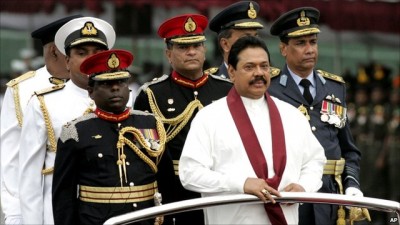Sri Lanka Elections: Return of Rajapaksa the Presidency, Would Unleash Full Benefits of China’s BRI for Sri Lanka

Opposition leader and former Defense Minister Lieutenant Colonel Gotabaya Rajapaksa won the first round of elections and will become Sri Lanka’s next president, thus returning his family to power after his brother Mahinda’s 2005-2015 presidency.
The latter was narrowly defeated in the January 2015 elections and attributed his surprise loss to foreign meddling, stating in March 2015 that
“It was very open, Americans, the Norwegians, Europeans were openly working against me. And RAW” (India’s foreign intelligence agency). He also added that “I asked the Indians, ‘Why are you doing this? It’s an open secret what you are doing.’ I had assured them that I would never allow the Sri Lankan soil to be used against any friendly country, but they had other ideas.”
His successor’s rule coincidentally saw Sri Lanka moving much closer to India, though the country didn’t pivot away from China like some analysts feared would happen at the time. Nevertheless, elements of President Sirisena’s administration politicized some of the island’s Belt & Road Initiative (BRI) investments, which contributed to the hostile information warfare narrative that attempted to falsely portray Sri Lanka as a “victim” of a so-called “debt trap” and therefore raise global doubts about the long-term strategic intentions of BRI.
There’s no greater refutation of that manufactured narrative than Gotabaya’s recent election since his brother was responsible for Sri Lanka’s strategic partnership with China that resulted in at least $7 billion dollars’ worth of BRI investments. His people voted for him not just because they want a strong leader who has a proven track record of security successes after he decisively ended the quarter-century-long civil war in 2009 (which is reassuring for them after last Easter’s Daesh terrorist attacks), but also because of his family’s ties with China.
Former President Mahinda’s vision was to make Sri Lanka a key node on the New Silk Road in order to assist its post-civil war recovery, though that strategy was thrown into uncertainty following President Sirisena’s reluctance (possibly under foreign pressure) to fully carry through with it. There was also a creeping perception among many people that Sri Lanka’s “recalibrated” foreign policy vector was turning it into other countries’ “junior partner”, especially after the US requested changes to its current “Status Of Forces Agreement” (SOFA).
An allegedly leaked copy of these proposed revisions was published by the press over the summer and claimed to show that American servicemen on the island would be granted immunity akin to the type that diplomats have per the Vienna Convention. This is extremely controversial when keeping in mind that such legal guarantees had previously been abused by American servicemen in Japan so much that the host state demanded changes to the original terms of their pact in order to finally prosecute some of those criminals.
It’s unclear at this moment whether Gotabaya will go through with the proposed SOFA revisions or not, but it’s abundantly clear that he and his brother will reprioritize their country’s commitment to BRI in order to return Sri Lanka to its path of prosperity in becoming one of the world’s most geostrategic trade and logistics hubs with time. This development isn’t aimed against India or the US, but would actually aid their long-term interests by ensuring stability in this formerly civil war-torn state, thus making it a better partner for all.
Proper development cannot occur without proper security measures first being in place, and it’s unfortunate that the previous government rolled back some of former President Mahinda’s security initiatives which in hindsight made the island vulnerable to Daesh’s worst-ever terrorist attack last Easter. Gotabaya plans to ensure that the security of all his compatriots is assured, after which all Sri Lankans can then begin reaping the benefits of further BRI investments.
The Rajapaksa’s return to power will therefore contribute to the stabilization of the Indian Ocean Region and enable the island nation to regain its previously lost role as one of the world’s most promising trade hubs.
*
Note to readers: please click the share buttons above or below. Forward this article to your email lists. Crosspost on your blog site, internet forums. etc.
Andrew Korybko is an American Moscow-based political analyst specializing in the relationship between the US strategy in Afro-Eurasia, China’s One Belt One Road global vision of New Silk Road connectivity, and Hybrid Warfare. He is a frequent contributor to Global Research.

